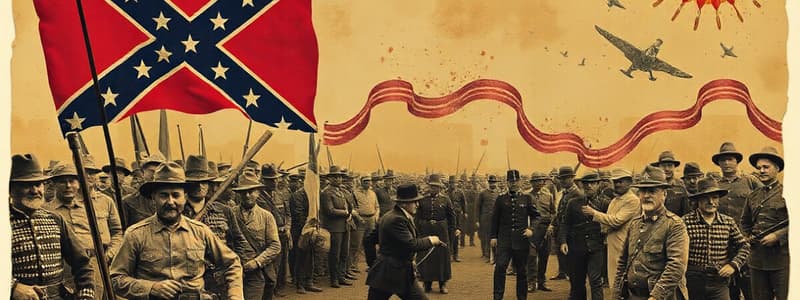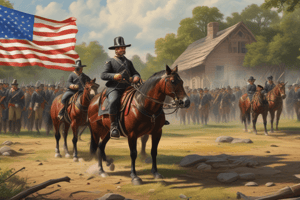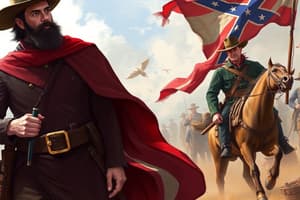Podcast
Questions and Answers
What political approach did Lincoln use at Fort Sumter to manage the crisis?
What political approach did Lincoln use at Fort Sumter to manage the crisis?
- He directly reinforced the fort with military troops, defying the Confederacy.
- He abandoned the fort to avoid conflict, recognizing Confederate sovereignty.
- He sent only essential food supplies to the fort, avoiding military reinforcement. (correct)
- He negotiated a treaty with the Confederacy, dividing federal assets.
Which factor significantly influenced the upper South's decision to secede after the attack on Fort Sumter?
Which factor significantly influenced the upper South's decision to secede after the attack on Fort Sumter?
- Pressure from abolitionist movements within their states.
- Economic incentives offered by the Confederacy.
- A desire to control federal infrastructure within their borders.
- Unwillingness to engage in military actions against other Southern states. (correct)
How did the North's superior industrial capacity primarily impact the Confederacy?
How did the North's superior industrial capacity primarily impact the Confederacy?
- By enabling the Union to quickly rebuild after battles, minimizing long-term damage.
- By facilitating the distribution of propaganda among the populace.
- By incentivizing more people to join the cause.
- By allowing the Union to produce more war materials, establish better transportation networks, and maintain a stronger fighting force. (correct)
What was the main goal of the Union's Anaconda Plan during the Civil War?
What was the main goal of the Union's Anaconda Plan during the Civil War?
How did the First Battle of Bull Run impact initial perceptions on both sides about the duration and nature of the Civil War?
How did the First Battle of Bull Run impact initial perceptions on both sides about the duration and nature of the Civil War?
What strategic realization emerged from the Battle of Shiloh?
What strategic realization emerged from the Battle of Shiloh?
In what way did ironclad ships revolutionize naval warfare during the Civil War?
In what way did ironclad ships revolutionize naval warfare during the Civil War?
How did the new technologies used during the Civil War primarily affect military tactics and casualty rates?
How did the new technologies used during the Civil War primarily affect military tactics and casualty rates?
What is a primary reason for General McClellan's hesitancy and eventual removal from command?
What is a primary reason for General McClellan's hesitancy and eventual removal from command?
What critical mistake did McClellan make before the Battle of Antietam that presented a significant advantage to the Union forces?
What critical mistake did McClellan make before the Battle of Antietam that presented a significant advantage to the Union forces?
Why did Britain ultimately remain neutral despite initial expectations of supporting the Confederacy?
Why did Britain ultimately remain neutral despite initial expectations of supporting the Confederacy?
How did Lincoln address the Trent Affair and avert potential war with Britain?
How did Lincoln address the Trent Affair and avert potential war with Britain?
What was a key effect of the Emancipation Proclamation on the Union's war aims and international standing?
What was a key effect of the Emancipation Proclamation on the Union's war aims and international standing?
How did Lincoln address disloyalty and dissent within the Union during the Civil War?
How did Lincoln address disloyalty and dissent within the Union during the Civil War?
What was the primary complaint among poor Confederates regarding the draft laws?
What was the primary complaint among poor Confederates regarding the draft laws?
What was the effect of the Emancipation Proclamation on black Americans?
What was the effect of the Emancipation Proclamation on black Americans?
In what ways did African American soldiers experience discrimination within the Union army?
In what ways did African American soldiers experience discrimination within the Union army?
How did the absence of men impact the Southern and Northern economies?
How did the absence of men impact the Southern and Northern economies?
During the Civil War, in what ways did the U.S. Sanitary Commission contribute to the Union war effort?
During the Civil War, in what ways did the U.S. Sanitary Commission contribute to the Union war effort?
What factors contributed to the food shortages experienced by the Confederacy?
What factors contributed to the food shortages experienced by the Confederacy?
Lee chose to lead the Confederate Army because:
Lee chose to lead the Confederate Army because:
What was General Sherman's strategy of 'total war' designed to do?
What was General Sherman's strategy of 'total war' designed to do?
Why is the Battle of Gettysburg considered a major turning point in the Civil War?
Why is the Battle of Gettysburg considered a major turning point in the Civil War?
What core message or value did Lincoln emphasize the most in the Gettysburg Address?
What core message or value did Lincoln emphasize the most in the Gettysburg Address?
What factor significantly influenced Lincoln's reelection chances in 1864?
What factor significantly influenced Lincoln's reelection chances in 1864?
Which event formally ended the Civil War?
Which event formally ended the Civil War?
Why were the terms of surrender generous?
Why were the terms of surrender generous?
What was the political impact of the Civil War on the balance of power between the federal and state governments?
What was the political impact of the Civil War on the balance of power between the federal and state governments?
What federal action helped set up the stock market?
What federal action helped set up the stock market?
How did the Civil War era economic changes primarily affect the North and the South?
How did the Civil War era economic changes primarily affect the North and the South?
Which action did Lincoln pass before his death but after winning?
Which action did Lincoln pass before his death but after winning?
What were the long-term effects of the Civil War on America?
What were the long-term effects of the Civil War on America?
What transformative effect did the Civil War have on the United States?
What transformative effect did the Civil War have on the United States?
What made The Civil War so deadly?
What made The Civil War so deadly?
What was a transformative aspect that civilian life took after and during the Civil War?
What was a transformative aspect that civilian life took after and during the Civil War?
Why did John Wilkes Booth assassinate the President?
Why did John Wilkes Booth assassinate the President?
Flashcards
Fort Sumter
Fort Sumter
Site of the first Civil War shots, Confederate victory
Anaconda Plan
Anaconda Plan
Union's strategy to blockade Southern ports, control Mississippi River, and capture Richmond.
Bull Run
Bull Run
First major Civil War battle, Confederate victory, showed war would be long.
Stonewall Jackson
Stonewall Jackson
Signup and view all the flashcards
George McClellan
George McClellan
Signup and view all the flashcards
Ulysses S. Grant
Ulysses S. Grant
Signup and view all the flashcards
Shiloh
Shiloh
Signup and view all the flashcards
David G Farragut
David G Farragut
Signup and view all the flashcards
Monitor vs. Merrimack
Monitor vs. Merrimack
Signup and view all the flashcards
Robert E. Lee
Robert E. Lee
Signup and view all the flashcards
Antietam
Antietam
Signup and view all the flashcards
Emancipation Proclamation
Emancipation Proclamation
Signup and view all the flashcards
Habeas Corpus
Habeas Corpus
Signup and view all the flashcards
Copperheads
Copperheads
Signup and view all the flashcards
Conscription
Conscription
Signup and view all the flashcards
Fort Pillow
Fort Pillow
Signup and view all the flashcards
Clara Barton
Clara Barton
Signup and view all the flashcards
income tax
income tax
Signup and view all the flashcards
Andersonville
Andersonville
Signup and view all the flashcards
Gettysburg
Gettysburg
Signup and view all the flashcards
Chancellorsville
Chancellorsville
Signup and view all the flashcards
Vicksburg
Vicksburg
Signup and view all the flashcards
Gettysburg Address
Gettysburg Address
Signup and view all the flashcards
William Tecumseh Sherman
William Tecumseh Sherman
Signup and view all the flashcards
Appomattox Court House
Appomattox Court House
Signup and view all the flashcards
National Bank Act
National Bank Act
Signup and view all the flashcards
Thirteenth Amendment
Thirteenth Amendment
Signup and view all the flashcards
Red Cross
Red Cross
Signup and view all the flashcards
John Wilkes Booth
John Wilkes Booth
Signup and view all the flashcards
Study Notes
- The Civil War took place in 1861.
Causes of The Civil War
- Seven Southern states seceded from the Union over slavery and states' rights issues in 1861.
- These states formed the Confederacy, raising an army.
- Confederate army attacked and seized Fort Sumter in Charleston, South Carolina in March.
- President Lincoln responded by calling for Union army volunteers.
Use of Force
- The central question was whether force could preserve the nation.
- Issues included: diplomacy preventing war, differences between civil and foreign wars, and the war's impact on society.
1864
- The Confederate vessel Hunley made the first successful submarine attack in history.
- Abraham Lincoln was reelected.
- Leo Tolstoy wrote War and Peace.
1865
- Lee surrendered to Grant at Appomattox.
- Andrew Johnson became president after Lincoln's assassination.
- Joseph Lister pioneered antiseptic surgery.
The Civil War Begins
- The secession of Southern states forced the North and South to arm themselves.
- The nation's identity was shaped, in part, by the Civil War.
Fort Sumter
- Major Robert Anderson defended it for 34 hours.
- Confederate attack on Fort Sumter initiated the Civil War.
Confederate States
- These states were formed on February 4, 1861.
- They began seizing federal installations like courthouses, post offices, and forts.
Lincoln's Dilemma
- He faced a dilemma on whether to reinforce or evacuate Fort Sumter.
- Reinforcing could start hostilities and push more slave states to secede.
- Evacuating would recognize the Confederacy as a legitimate nation, angering Republicans and endangering the Union.
Lincoln's Decision
- He decided not to abandon Fort Sumter but would send in "food for hungry men" without reinforcement.
Jefferson Davis's Decision
- He faced a dilemma of damaging the Confederacy's image by doing nothing, or turning secession into war by attacking Fort Sumter.
- Davis chose war, ordering the attack on April 12.
- Confederate batteries bombarded Fort Sumter, leading to its surrender.
Virginia Secession
- News of Fort Sumter united the North, causing Lincoln to call for 75,000 volunteers.
- Virginia seceded due to being unwilling to fight Southern states on April 17, heavily impacting the Union.
- Arkansas, Tennessee, and North Carolina followed Virginia in May, bringing the total to 11 Confederate states.
- Western counties in Virginia, being antislavery, seceded and joined the Union as West Virginia in 1863.
- Maryland, Delaware, Kentucky, and Missouri remained in the Union, though many citizens fought for the Confederacy.
Resources in 1861
- The North had advantages in naval tonnage (25 to 1), iron production (15 to 1), and firearms production (32 to 1).
- The North also had a larger total population, more men eligible for military service, and more industrial workers.
American Expectation
- Both sides expected a short war.
Union and Confederate Strategies
- The Union had more resources, factories, food production, and railroads.
- Lincoln was a decisive leader.
- The Confederacy had advantages of "King Cotton," first-rate generals, a strong military tradition, and motivated soldiers defending their homeland.
- The South had resistance to centralization due to a tradition of local government.
- The Union's three-part plan involved blockading Southern ports, splitting the Confederacy via the Mississippi River, and capturing Richmond.
- The Confederacy's strategy was mostly defensive, but they would attack the North at times
Bull Run
- The first major bloodshed occurred on July 21.
- Union soldiers marched toward Richmond but met a Confederate army near Bull Run.
- The Union army initially gained ground, but the Confederates stood firm, inspired by General Thomas J. Jackson.
- Confederate reinforcements arrived in the afternoon and won the first victory for the South.
- Union troops retreated in panic to the capital.
Union Armies in the West
- Lincoln called for 500,000 men to enlist for three years after the defeat at Bull Run.
- This new Union army was led by General George McClellan near Washington.
- Ulysses S. Grant invaded western Tennessee in February 1862.
- In 11 days, Grant's forces captured Fort Henry and Fort Donelson which were strategic for the Union.
- Grant informed the Southern commander "no terms except unconditional and immediate surrender".
Shiloh
- Confederate forces surprised the Union forces near Shiloh in late March 1862.
- Grant reorganized his troops and counterattacked the following day, leading to a Confederate retreat.
- Nearly one-fourth of the 100,000 troops were killed, wounded, or captured.
- The Union had long-range impact when the drive to take the Mississippi might succeed.
Battle on Lower Mississippi
- In 1862, Grant pushed to the Mississippi River while David G. Farragut approached the river's mouth in Louisiana.
- The Navy was assigned to seize New Orleans, the Confederacy's largest city and busiest port.
- He ran his fleet in spite of two Confederate forts.
- The Confederate was able to take total control of Baton Rouge and Natchez in the next two months.
Warfare Revolution
- New war machines which were the ironclad ship changed military strategy and contributed to the war's high casualty rate.
Ironclads
- Instrumental in the successes of Grant and Farragut in the West.
- Ironclad ships could splinter wooden ships, withstand cannon fire, and resist burning.
- The Monitor and the Merrimack (Virginia) battled on March 9, 1862, ending the era of wooden fighting ships.
New Weapons
- Development occurred due to the rifles and the Minié ball which were more accurate
- The Civil War used hand grenades and land mines
War for the Capitals
- An issue for the civil war, was General McClellan
- McClellan was very cautions and he complained about the lack of the numbers for the Union.
- McClellan was finally underway in the Spring of 1862 and he encountered General Johnston.
- After Johnston was wounded Robert E. Lee took over and the Confederates won.
- The Confederates had less troops but saved Maryland
- Lincoln fired McClellan
Antietam
- McClellan acted aggressively and the armies fought.
- The Union gained victory.
- Lincoln fired McClellan
Section 2: The Politics of War
Emancipation Proclamation
- Focus of the war shifted due to President Lincolns decisions.
Britain Neutrality
- Britain decided that neutrality was the best policy.
British Merchant Ship, The Trent
- Captain Charles Wilkes of the American warship San Jacinto brought the two back.
- Britain then threatened war and dispatched 8,000 troops to Canada.
- Lincoln freed the two.
Proclaiming Emancipation
- Abolitionist feeling grew in the North.
Lincoln's view of Slavery
- Wanted to save the Union, if not save of destroy Slavery.
- Lincoln found a way to use his constitutional war powers to end slavery.
Emancipation Proclamation
- Lincoln issued on January 1, 1863.
Reactions to the Proclamation
- Despite the lack of practical effect, there was immense symbolic importnace.
- It had become to fight and free the slaves.
- Free blacks also welcomed the section of the Proclamation that allowed them to enlist in the Union army.
- Not everyone in the North approved with the many Union soldiers.
- Confederates reacted to the Proclamation with outrage.
Lincolns Actions
- Dealt with Copperheads.
Conscription
- The process to which the Union Army had a constant flow of soldiers.
The Riott Continue
- As the draft lists started it caused violence and pillage in many areas.
Section 3: Life During Wartime
Civil War Brought
- Dramatic social and economic changes to American society.
American Americans Fought
- Americans played an important role to end slavery.
Confederate
- The Confederate money was in shambles.
The War Region
- The Civil war helped the North, there was no cotton
- Army needed supply and western wheat farmers had reapers and other resources that helped other companies.
Solders Suffered
- They were quick to be disillusioned, both Union and Confederate.
- There was a poor and unhygienic situation due to conditions.
Civial War Medicine
- The hygienic conditions of army camps were bad, also to support the United States Sanitary Commission
What the the Prison's Like?
- Improvments could not reach the war prisons, conditions were worse than Army camp
Section 4 - The North Takes Charge
Key Victories
- These took place at Vicksburg and Gettysburg.
First Speech
- Lincoln took little more than 2 minutes to speaks, but it is a renowned moment in American speaking.
Military Strateegy
- On April first, at long range what will give all troops an equal chance?
Grant Apponted Sherman
- The hero, commander of all Union.
- Aims is to fight government and its will to make certain that it does not fall apart
End of Confederate
- After a lot of fighting and chaos, the Civil came to a hault with some victories leading to the next.
The Final Battle
- The union troops destroyed many buildings and damaged other.
Sherman Instructed Troops
- Heating and bending the metal rails, destroying Atlanta.
Section 5-The Legacy of the War
- The Federal Governemtn established supreme authority.
One American's Story
- Garrison H. White was returning the the state where once in bondage.
The War Changed the Nation
- It caused tremendous political, economic, technological, and social change.
Political Changes
- In effect the power of the Federal Government.
- Congress the to keep the economy at large.
Studying That Suits You
Use AI to generate personalized quizzes and flashcards to suit your learning preferences.




